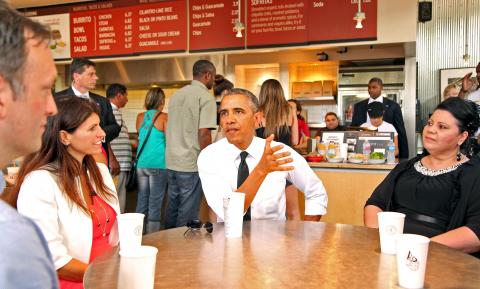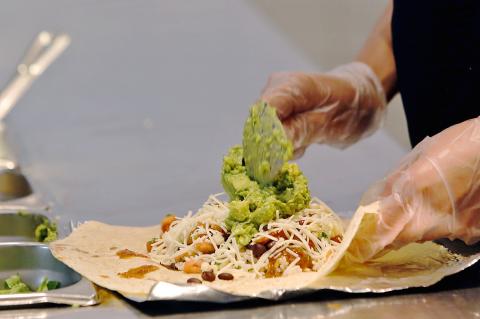The numbers were startling: Shares of Chipotle Mexican Grill shot up 12 percent on Tuesday after the company reported a nearly 26 percent spurt in its quarterly profit. For the fast-food industry, this was fresh evidence that the world of Big Macs and Doritos Locos Tacos has room for a menu with healthier-than-average food and higher-than-average prices.
However, it came as no surprise to a new generation of smaller fast-food chains that are coming up fast behind Chipotle and its peers, and taking its “food with integrity” mantra even further.
A handful of rapidly growing regional chains around the country — including Tender Greens, LYFE Kitchen, SweetGreen and Native Foods — offer enticements like grass-fed beef, organic produce, sustainable seafood and menus that change with the season. Most promise local ingredients; some are exclusively vegetarian or even vegan. A few impose calorie ceilings, and others adopt service touches like busboys and china plates.

Photo: EPA
And despite the higher costs and prices, all are thriving and planning national expansions, some directed by alumni of fine dining or of fast-food giants like McDonald’s.
Their success marks a milestone: After decades of public hand-wringing about the empty calories and environmental impact of fast food, the farm-to-table notions that have revolutionized higher-end US restaurants have finally found a lucrative spot in the takeout line. The result already has a nickname: farm to counter.
“This is not a passing fad,” National Restaurant Association research director B. Hudson Riehle said, adding that locally grown food and sustainability were the top two customer priorities reported this year in the group’s annual poll of US chefs.

Photo: Bloomberg
“It’s only going to get stronger,” he said.
These ambitious new chains make up only a sliver of the nation’s US$683 billion restaurant industry. However, all are within its swiftest-growing segment, “fast-casual,” a subset of fast food that includes places like Chipotle and Panera, whose offerings are marketed as a rung or two higher than those of Burger King or Taco Bell: fewer frozen and highly processed ingredients, more comfortable seats, better coffee and (sometimes) healthier food.
Fast food is served with a halo of virtue nearly everywhere these days: Subway introduced wholesome-sounding “nine-grain” bread in 2009, and McDonald’s made itself the country’s largest buyer of apples when it started selling apple slices in 2004.
Chipotle, the first chain to dive deeply into animal-welfare issues with its vow (since suspended from time to time) to serve only “naturally raised” antibiotic-free meat, recently posted controversial YouTube videos that demonize factory farming and boast of its relationship with small family farms.
However, in order to be green enough for today’s customers and to justify charging US$12 for salad, the newer chains promise an even more exalted level of nourishment.
By adapting to the seasons, by eliminating genetically modified ingredients and mainly by serving “real” food — the kind of salad a Whole Foods shopper might toss at home, or the grilled herb-dusted albacore tuna that the same person might order in a more expensive restaurant — these chains set a higher standard for fast food.
That means no protein-powder shakes, turkey wraps and egg-white omelets, the staples of standard “healthy” chains, and more choices like the Cobb salad at Dig Inn, an eight-store chain in New York City that opened its first restaurant in 2011.
The substantial bowl of greens and grape tomatoes is garnished with blue cheese free of bovine growth hormones, local organic hard-boiled eggs, what the menu calls “naturally raised” bacon, freshly squeezed lemon juice, extra-virgin olive oil and yogurt (476 calories in all, for US$9.19).
“Good food doesn’t have to be expensive,” chain founder Adam Eskin said. “It’s not calorically defined. It’s not about being vegan or vegetarian or pescatarian. It’s just knowing where your food comes from and exactly what’s in it.”
Some of these terms are little more than buzzwords and branding: “Naturally raised” is not a category recognized by the US Department of Agriculture and it is debatable whether consumers should be concerned about the amount of growth hormone in a tablespoon of cheese.
Still, posting the same prestigious ingredients usually seen on fine-dining menus on the wall of a fast-food chain is a bold move and will soon become a challenge for the chains that plan to go national.
“Local and seasonal works for us in California,” said Erik Oberholtzer, a founder of Tender Greens, a Chez-Panisse-meets-Chipotle concept that now has 14 stores in California.
The company works with Scarborough Farms, a 160-hectare, family-run farm in Oxnard, California, as an investor as well as a supplier.
“I don’t know if it would be scalable,” Oberholtzer said.
If anyone has experience in scalability, it is the founders of LYFE Kitchen. Mike Donahue and Mike Roberts left McDonald’s in 2006: Roberts had been the company’s global chief operating officer and Donahue its chief communications officer in the US. Between them, the two had spent nearly 50 years nurturing the world’s largest restaurant chain and responding to near-constant criticism of its agricultural, ethical and nutritional practices.
“Having worked at the scapegoat for everything that’s wrong with food in America, we know what issues consumers care about,” Donahue said.
In 2011, with more than 100 investors, they opened the first LYFE Kitchen; now they simply refer to McDonald’s as “the old place.”
“At the old place, we had to learn everything about GMOs [genetically modified organism], recycling, animal welfare, calories, sodium, fat, social responsibility,” Donahue said. “We took all of that and poured it into the new place.”
LYFE Kitchen has a mission to go with its name (an acronym for Love Your Food Everyday) and motto (Eat Good. Feel Good. Do Good.). Each of its 10 restaurants, strategically distributed from California to Illinois, has a wall of fluffy herbs growing in the dining room, serves only grass-fed beef, uses china instead of plastic and keeps all entrees under 600 calories.
“We want to be the place where the vegan can come for the portobello burger with almond-milk cheese, with the Neanderthal friend who just wants a really good cheeseburger,” Donahue said. “We want to beat the vegetarian veto, where one person gets to decide where the whole group is going to have lunch.”

SEMICONDUCTOR SERVICES: A company executive said that Taiwanese firms must think about how to participate in global supply chains and lift their competitiveness Taiwan Semiconductor Manufacturing Co (TSMC, 台積電) yesterday said it expects to launch its first multifunctional service center in Pingtung County in the middle of 2027, in a bid to foster a resilient high-tech facility construction ecosystem. TSMC broached the idea of creating a center two or three years ago when it started building new manufacturing capacity in the US and Japan, the company said. The center, dubbed an “ecosystem park,” would assist local manufacturing facility construction partners to upgrade their capabilities and secure more deals from other global chipmakers such as Intel Corp, Micron Technology Inc and Infineon Technologies AG, TSMC said. It

NO BREAKTHROUGH? More substantial ‘deliverables,’ such as tariff reductions, would likely be saved for a meeting between Trump and Xi later this year, a trade expert said China launched two probes targeting the US semiconductor sector on Saturday ahead of talks between the two nations in Spain this week on trade, national security and the ownership of social media platform TikTok. China’s Ministry of Commerce announced an anti-dumping investigation into certain analog integrated circuits (ICs) imported from the US. The investigation is to target some commodity interface ICs and gate driver ICs, which are commonly made by US companies such as Texas Instruments Inc and ON Semiconductor Corp. The ministry also announced an anti-discrimination probe into US measures against China’s chip sector. US measures such as export curbs and tariffs

The US on Friday penalized two Chinese firms that acquired US chipmaking equipment for China’s top chipmaker, Semiconductor Manufacturing International Corp (SMIC, 中芯國際), including them among 32 entities that were added to the US Department of Commerce’s restricted trade list, a US government posting showed. Twenty-three of the 32 are in China. GMC Semiconductor Technology (Wuxi) Co (吉姆西半導體科技) and Jicun Semiconductor Technology (Shanghai) Co (吉存半導體科技) were placed on the list, formally known as the Entity List, for acquiring equipment for SMIC Northern Integrated Circuit Manufacturing (Beijing) Corp (中芯北方積體電路) and Semiconductor Manufacturing International (Beijing) Corp (中芯北京), the US Federal Register posting said. The

India’s ban of online money-based games could drive addicts to unregulated apps and offshore platforms that pose new financial and social risks, fantasy-sports gaming experts say. Indian Prime Minister Narendra Modi’s government banned real-money online games late last month, citing financial losses and addiction, leading to a shutdown of many apps offering paid fantasy cricket, rummy and poker games. “Many will move to offshore platforms, because of the addictive nature — they will find alternate means to get that dopamine hit,” said Viren Hemrajani, a Mumbai-based fantasy cricket analyst. “It [also] leads to fraud and scams, because everything is now